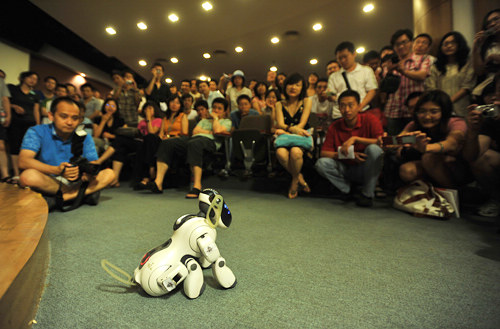|
 |
|
MAN'S BEST ROBOT FRIEND: Science enthusiasts watch an intelligent robot dog show held by the Science Squirrels Club (MAO SIQIAN) |
Can people actually sleep with their eyes open? What causes red dyes to run in the wash? Why do headphone wires get twisted inside jacket pockets?
While the answers to these great, life mysteries can easily be ascertained from friends or family, for the most scientific solutions it's best to ask the Squirrels.
The Science Squirrels Club, a Chinese Internet community founded by science enthusiasts, has attracted a loyal following of young people from across China in the past four years, triggering a kind of science renaissance in China. Now, the Squirrels, with their stylish take on science and their scientific approach to problem solving and learning, are watching a growing number of youth embrace science.
The Science Squirrels Club gets its name from a metaphor. Science, explained the club members, is like a nut: nutritious inside but surrounded by a shell that is hard to crack. And like actual squirrels, the Squirrels are tackling the challenge of cracking those hard scientific "nuts."
Originally a science blog, the club was named one of the "Best Global Chinese Blogs" in 2008. The award described them as exploring "everything from roses to spaceships, covering almost all themes in science." The win was an affirmation of their methods: Topics are kept interesting but also academically correct. Since then, the blog has expanded into a full-blown community. No other scientific group in China has yet to garner this amount of attention from a generation raised on fast food and pop music.
"Fun" is what explains the Squirrels' success. Ideas discussed on the site range from the universal to the trivial, sometimes odd, but always eye-catching. They focus on relating science to daily life, like how to date with the help of statistics. Popular phrases replace confusing jargon to explain once-inscrutable scientific theory.
Still, science remains a serious endeavor. In their essays the Squirrels talk about life, love and politics, but always from a scientific perspective. Each piece goes through a process of scrutiny, critique and revision before it is published online.
"Precision is always at the top of our list," says You You, the club's chief editor. "We add references at the end of essays. Normally, references only appear in research papers, but we insist on doing it."
The Squirrels also move beyond the virtual world, into the real world. They offer activity packages like film parties where people gather to watch a scientific documentary, followed by a group discussion. Questions are answered and knowledge shared—and above all enjoyed. Other packages involve laboratory experiments and visits to science centers. The activities attract thousands; applicant numbers are usually several times the maximum that the group can accommodate.
Recently, the club launched a science reporting training program. The training courses are for science journalists, but teachers will also be invited to attend future program.
"We try to get wide coverage with our activities," says Tian Chen, a senior Squirrel responsible for club operations. "It's hard to make science popular, so we try to add some fad aspects. Meanwhile, we want to integrate science into the media and education in order to get more people involved."
Ji Shisan, Science Squirrels' founder, graduated with a Ph.D in neurobiology in 2007, a task that took 11 years to complete. But, a longtime lover of writing, he moved away from his future career as a scientist and began writing science columns for different media outlets.
"Scientific research requires one to dive into a certain subject in depth, while science-related communication involves wide knowledge. I think I like that more," Ji says of his career move.
| 